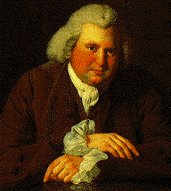This is an old revision of this page, as edited by Tarquin (talk | contribs) at 19:36, 20 August 2003 (Josiah Wedgwood, COleridge & co). The present address (URL) is a permanent link to this revision, which may differ significantly from the current revision.
Revision as of 19:36, 20 August 2003 by Tarquin (talk | contribs) (Josiah Wedgwood, COleridge & co)(diff) ← Previous revision | Latest revision (diff) | Newer revision → (diff) |
Erasmus Darwin (December 12,1731 - April 18,1802) trained as a physician and wrote extensively on medicine and botany, as well as poetry. Living in Birmingham and Lichfield, England. He was one of the founder members of the Lunar Society.
He was born near Nottingham, and studied at Cambridge and Edingurgh. He practised medicine in Lichfield in Staffordshire for twenty years; George III invited him to be royal physician but he declined.
His book Zoonomia (1794-6) is widely considered to foreshadow the pre-Darwinian theories of Jean Baptiste Lamarck, and maybe even the theory of evolution formulated by his grandson Charles Darwin. Another of his grandsons was Francis Galton. His experiments in galvanism inspired Mary Shelley to write Frankenstein.
His poetry was admired by Coleridge and Wordsworth; and often made reference to his interests in science, for exampls botany and steam engines. His most famous work of poetry was The Botanic Garden.
He was in inventor of several devices, though did not patent any of them. One was a horizontal windmill, which he design for Josiah Wedgwood (who would be Charles Darwin's other grandfather).